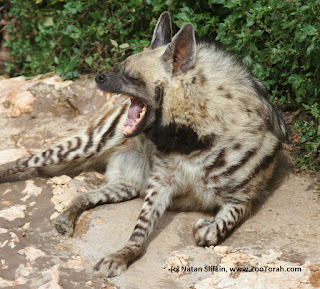Does the brutal killing of an innocent and endangered wild animal, done for no purpose other than to satisfy the blood lust of the killers, cause global outrage? That depends.
Everyone has heard about the horrible killing of Cecil the lion. A google search returns over 43million hits. Nearly half a million people have signed a petition calling for “Justice for Cecil.” Jimmy Kimmel raised $150,000 for the conservation unit in charge of Cecil.
I love lions, I have watched them in Africa, and I found the story of Cecil’s killing to be tragic. Yet there was another, similar, incident in the last few days that went virtually unnoticed. A striped hyena was walking alongside a road near Hebron. Several Palestinian drivers noticed it and chased it. Finally cornering it, they got out of their cars, and stoned it to death. And the entire incident was filmed and uploaded to the internet.
Number of hits on google? Eight.
Why the overwhelming difference in interest? Striped hyenas are even more endangered than lions. And an act of brutality carried out by several people is surely more significant than one carried out by one person. To be sure, the lion was more famous than the hyena even in life. Still, that alone does not suffice to account for the enormous disparity in interest shown in these two stories. Rather, it seems that there are other, less justifiable factors.
One is that lions are more endearing animals than hyenas. While I personally have a soft spot for hyenas, especially after playing with a tame one, they don’t have the same beauty as lions. That’s why Disney, in The Lion King, made lions into the good guys (unless, of course, the lion has a British accent), and hyenas the bad guys. But that’s not an intellectually defensible approach. If we care about animals, we should care about the ugly ones just as much as the beautiful ones.
I suspect that there is another factor at play here: the identity of the villain. With the lion, the villain is a rich, white, presumably Republican, American. That’s the type of person that the world loves to hate. Whereas with the hyena, the villains are a group of Palestinians. It’s not so popular to show them enjoying throwing rocks to kill.
There used to be a great television show in England called Spooks, about the counter-terrorism service known as Mi5. It was intended to be more realistic than similar shows from the US. Yet as the series went on, a bizarre pattern developed. The bad guys were almost always white Americans, British white supremacists, or the Mossad. There was almost never a Moslem terrorist. This was despite the fact that the real-life Mi5 is currently monitoring 2000 terrorist suspects in the UK, every single one of which is Moslem.
I’m currently reading a fascinating book called Catch The Jew. The author, a secular ex-Israeli, visited all parts of Israel, under the guise of being a German non-Jew. He documents his astonishment as he discovers that the vast Jewish and international effort to assist the Palestinians is largely motivated not by concern for the Palestinians, but rather by hatred of Israel. The world is perpetually up in arms about the treatment of Arabs by Israel, yet it cares little about the inconceivably worse treatment of Arabs by Arabs.
If you care about the senseless slaughter of endangered animals, then you should care about the unnamed hyena as much as you care about Cecil the lion. But for many people, it’s not about caring for the victim — it’s about hating the villain.
(This post originally appeared on Rabbi Slifkin’s wonderful blog: Rational Judaism.)
Like this story? Buy Rabbi Slifkin’s “The Torah Encyclopedia of the Animal Kingdom.”
The words of this author reflect his/her own opinions and do not necessarily represent the official position of the Orthodox Union.


